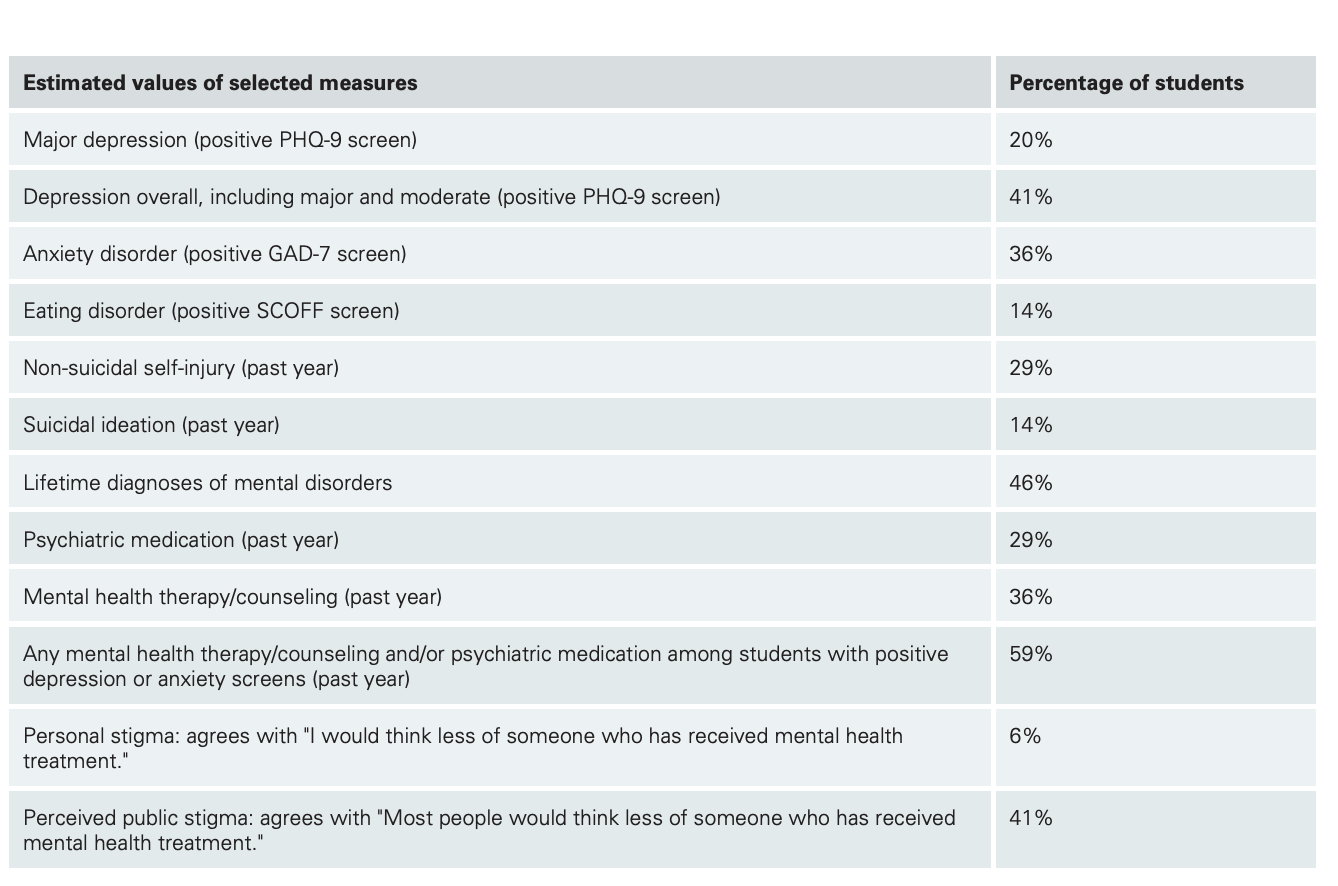You have /5 articles left.
Sign up for a free account or log in.

Penguin Random House
Never Enough: When Achievement Culture Becomes Toxic—and What We Can Do About It by Jennifer Breheny Wallace
Published in August 2023
What would you say is the most wicked problem facing higher education?
Generative AI? College costs and student debt? Persistently low graduation rates?
For many of us in higher education, the student mental health crisis will top any list of challenges.
Look at the percentages below from the 2022–23 Healthy Minds Study, a national survey of college students. According to these data, one in five students faces major depression, while four in 10 report moderate or major depression. Over a third of students report they are navigating an anxiety disorder.
Over all, more than six in 10 college students meet the criteria for one or more mental health problems. Most worrying, the proportion of students facing mental health challenges has risen by nearly 50 percent since 2013.

The causes of our college student mental health crisis are multifactorial. Student mental well-being is a complex issue. A wicked problem. Any effective university response to the student mental health crisis will need to be sustained, creative and robust.
One potential clue to understanding why so many college students are struggling with mental health challenges might be found in Jennifer Breheny Wallace’s excellent new book, Never Enough.
After reading Never Enough, it is difficult to avoid the conclusion that today’s college students are likely to arrive prestressed. The rigors of college life seem tame compared to the pressure cooker that is the life of high schoolers hoping to be admitted to a top-ranked institution of higher learning.
Never Enough has three aims. The first is to explain the rise of achievement culture within the subset of ZIP codes populated by highly educated parents. The second goal of the book is to document the corrosive effects on adolescent mental health of overscheduling, hypernurturing and intensifying academic and extracurricular competition. And finally, Never Enough seeks to offer some solutions to parents who want to support their children’s success while prioritizing their well-being.
Why has adolescent achievement culture grown much more intense among the professional class? Wallace hypothesizes that there are no bad actors at work. Parents decide to enrich and invest in their kids because they understand how precarious economic security has become. Not wanting their children to live paycheck to paycheck in adulthood, parents view their job as prepping their offspring for the relative security of a professional career.
Parents investing more time, money and attention in their children is not a negative trend. The problem, as Never Enough details through both data and stories, is that parental aspirations have resulted in unproductive pressures for their offspring. There are not enough slots at brand-name colleges and universities for every qualified applicant to be admitted.
In conflating future professional career security with success at the college admissions game, parents (and their kids) have placed themselves in an impossible bind. Spots at the nation’s top colleges and universities have grown little while the pool of applicants has swelled. In 1987 (my first year), the acceptance rate for the most selective colleges and universities was around 20 percent. Today, many universities accept fewer than one in 10 applicants.
While reading Never Enough might help parents recognize the causes and consequences of the stresses their teenagers are living under, the book is less successful in offering solutions. As a parent who tried to navigate my kids’ college-related high school stress, I know there is little even the most laid-back dads and moms can accomplish. The pressure comes mainly from peers.
One solution is for parents to choose not to live in a Super Zip, a ZIP code where educational attainment and household incomes are in the top 5 percent. Never Enough raises the intriguing possibility that parents may be doing their kids a disservice by sacrificing to afford an expensive home in a community with a highly ranked school system.
Never Enough would be an excellent book for every incoming first-year student to read and discuss, with the idea that universities might serve as a counterweight to the toxic achievement culture that so many first-year students have been navigating.
If you are concerned about college students’ mental well-being—and who isn’t these days—then reading and talking about Never Enough could help clarify and expand that campus conversation.
What are you reading?




